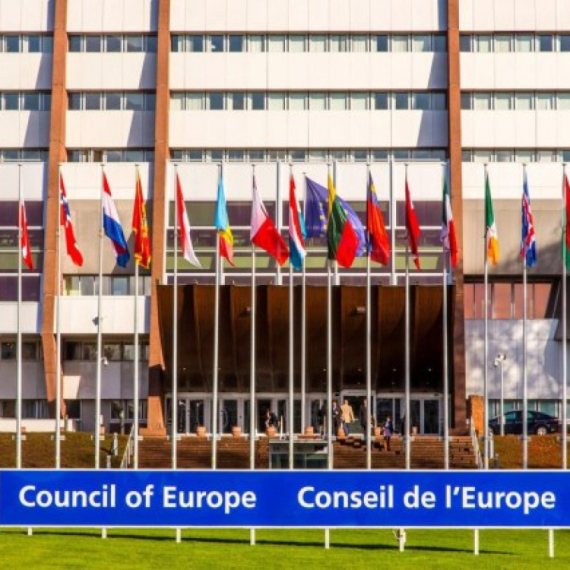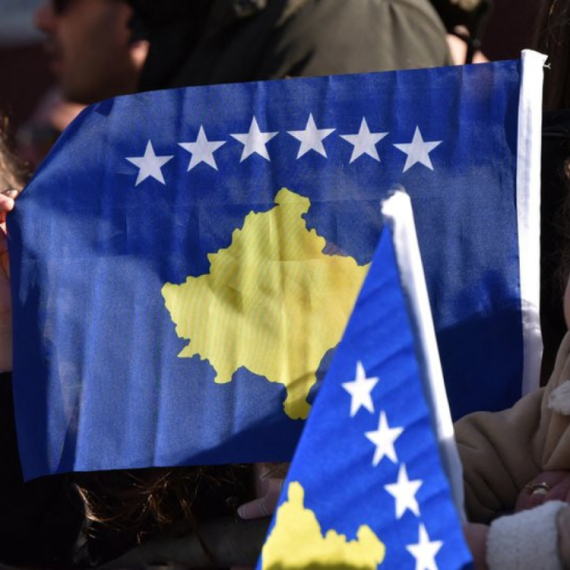Cvetković presents new anti-crisis package
The government has announced its plan for economic stability today, envisaging budget savings of EUR 1bn through more economical public administration.
Tuesday, 07.04.2009.
09:36

The government has announced its plan for economic stability today, envisaging budget savings of EUR 1bn through more economical public administration. "Besides cheaper public administration, the new package of economic measures will also guarantee social responsibility and maintain the standard of living, stimulate production and employment, and give support to public works and capital investment in infrastructure,“ said PM Mirko Cvetkovic, outlining the strategy. Cvetkovic presents new anti-crisis package Cvetkovic said that 85 percent of the planned budget savings of EUR 1bn would be generated by cutting costs and 15 percent by increasing revenue. Some of these measures, he said, were temporary because of the economic crisis, while others were strategic and their goal was to increase the efficiency of public administration. Under the new measures, ministry spending will be cut by a quarter, generating EUR 430mn in savings, while spending on all budget users will be slashed by 40 percent, bringing EUR 129mn in savings. The new measures also envision a freeze on salaries in public, provincial and local administration, as well as in public companies and agencies, together with a freeze on pensions, giving a further EUR 139mn saving. It was also decided to temporarily reduce public sector salaries, with those between RSD 40,000 (EUR 45) and RSD 100,000 (EUR 1,070) to be cut by 10 percent, and those over RSD 100,000 by 15 percent. The highest net salaries will be capped at a level equivalent to six times the national average salary. This measure is expected to create savings of EUR 10.7mn to 21.4mn, which will be paid into a special budget fund. This measure applies only to public companies, public agencies and other organizations in full state ownership, and will not affect the salaries of those working in education, health care, culture, or social welfare, or in the army police, army and judiciary. It was also announced today that 10 percent of jobs in public administration would be axed, and that the reforms in this sector will mean further redundancies. Among the other measures are increases in fuel excise and a temporary tax on mobile phone charges, expected to bring in EUR 86mn altogether. Mladjan Dinkic, Mirko Cvetkovic (FoNet) IMF: No deadline Head of the IMF mission to Serbia Albert Jaeger told daily Blic that there was no deadline for the new measures' adoption, stating that "the quicker a political consensus is reached, the better, because applying tangible measures takes time and effort." "We'll be able to react fairly quickly once the government takes its decision and begins to take reliable steps towards filling the budgetary hole," said Jaeger, adding that he expected to hear the details of the alternative proposal, now that the solidarity tax plan had been dropped. The daily states that the final decision on the new measures came on Sunday evening, when Cvetkovic and Economy Minister Mladjan Dinkic met with President Boris Tadic. On Monday afternoon, Dinkic outlined the new anti-crisis plan to a delegation of the Serbian Union of Independent Trade Unions. However, the unions say that they will not back out of their protest scheduled for April 29. Construction union official Dusan Vukovic said that the final measures had still not been presented “on paper,” but that he had not been content with what he had heard. “The bit about economic recovery isn’t enough. We think that the expectations of all employees, the unemployed, the young, pensioners, can be met in these few days and weeks, so we’ll be going ahead with our protest as we have to show our dissatisfaction and hopelessness, firstly with the inadequate implementation of measures, and then with the measures in the pipeline,” said Vukovic.
Cvetković presents new anti-crisis package
Cvetković said that 85 percent of the planned budget savings of EUR 1bn would be generated by cutting costs and 15 percent by increasing revenue.Some of these measures, he said, were temporary because of the economic crisis, while others were strategic and their goal was to increase the efficiency of public administration.
Under the new measures, ministry spending will be cut by a quarter, generating EUR 430mn in savings, while spending on all budget users will be slashed by 40 percent, bringing EUR 129mn in savings.
The new measures also envision a freeze on salaries in public, provincial and local administration, as well as in public companies and agencies, together with a freeze on pensions, giving a further EUR 139mn saving.
It was also decided to temporarily reduce public sector salaries, with those between RSD 40,000 (EUR 45) and RSD 100,000 (EUR 1,070) to be cut by 10 percent, and those over RSD 100,000 by 15 percent.
The highest net salaries will be capped at a level equivalent to six times the national average salary.
This measure is expected to create savings of EUR 10.7mn to 21.4mn, which will be paid into a special budget fund.
This measure applies only to public companies, public agencies and other organizations in full state ownership, and will not affect the salaries of those working in education, health care, culture, or social welfare, or in the army police, army and judiciary.
It was also announced today that 10 percent of jobs in public administration would be axed, and that the reforms in this sector will mean further redundancies.
Among the other measures are increases in fuel excise and a temporary tax on mobile phone charges, expected to bring in EUR 86mn altogether.
IMF: No deadline
Head of the IMF mission to Serbia Albert Jaeger told daily Blic that there was no deadline for the new measures' adoption, stating that "the quicker a political consensus is reached, the better, because applying tangible measures takes time and effort.""We'll be able to react fairly quickly once the government takes its decision and begins to take reliable steps towards filling the budgetary hole," said Jaeger, adding that he expected to hear the details of the alternative proposal, now that the solidarity tax plan had been dropped.
The daily states that the final decision on the new measures came on Sunday evening, when Cvetković and Economy Minister Mlađan Dinkić met with President Boris Tadić.
On Monday afternoon, Dinkić outlined the new anti-crisis plan to a delegation of the Serbian Union of Independent Trade Unions. However, the unions say that they will not back out of their protest scheduled for April 29.
Construction union official Dušan Vuković said that the final measures had still not been presented “on paper,” but that he had not been content with what he had heard.
“The bit about economic recovery isn’t enough. We think that the expectations of all employees, the unemployed, the young, pensioners, can be met in these few days and weeks, so we’ll be going ahead with our protest as we have to show our dissatisfaction and hopelessness, firstly with the inadequate implementation of measures, and then with the measures in the pipeline,” said Vuković.
























































Komentari 2
Pogledaj komentare